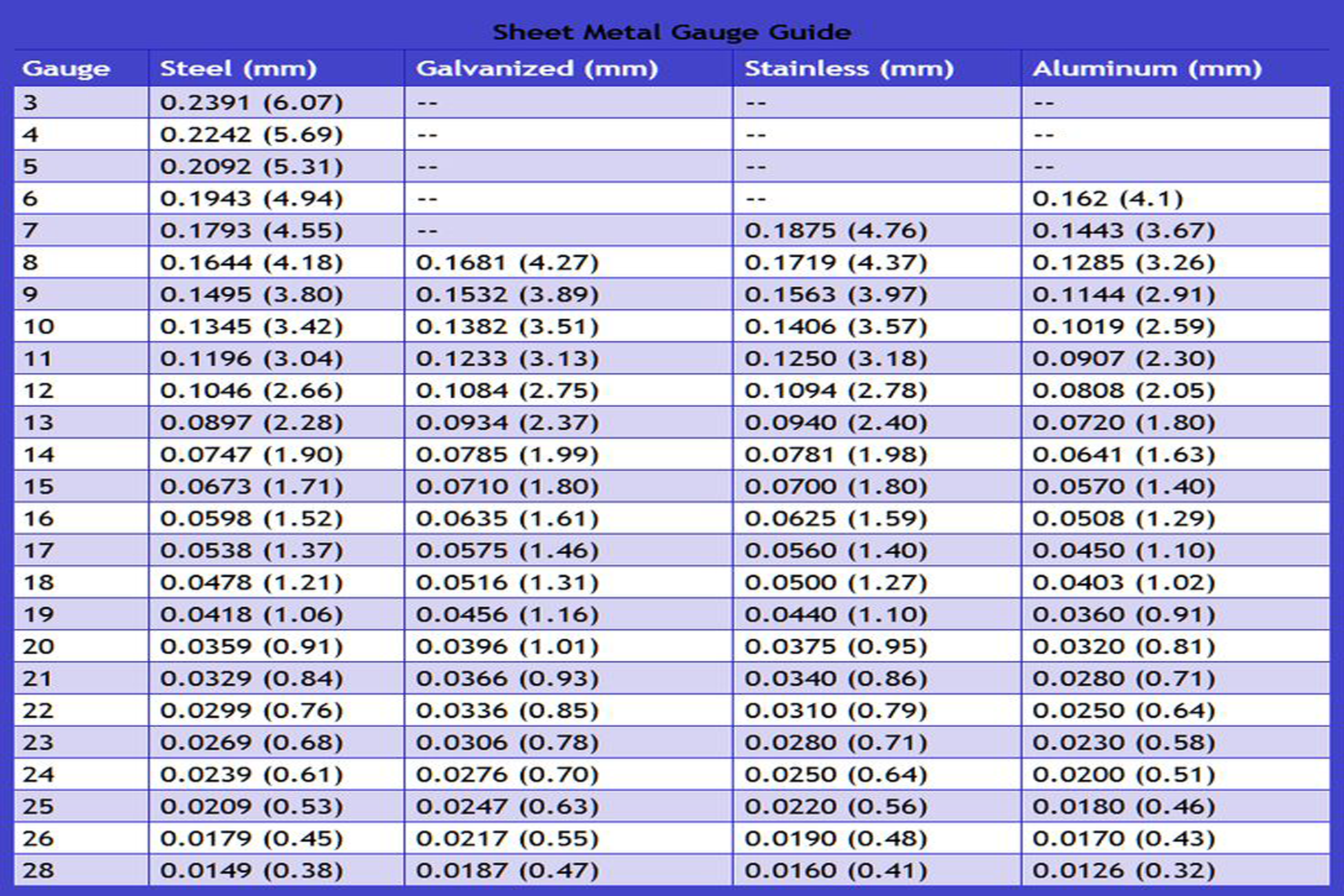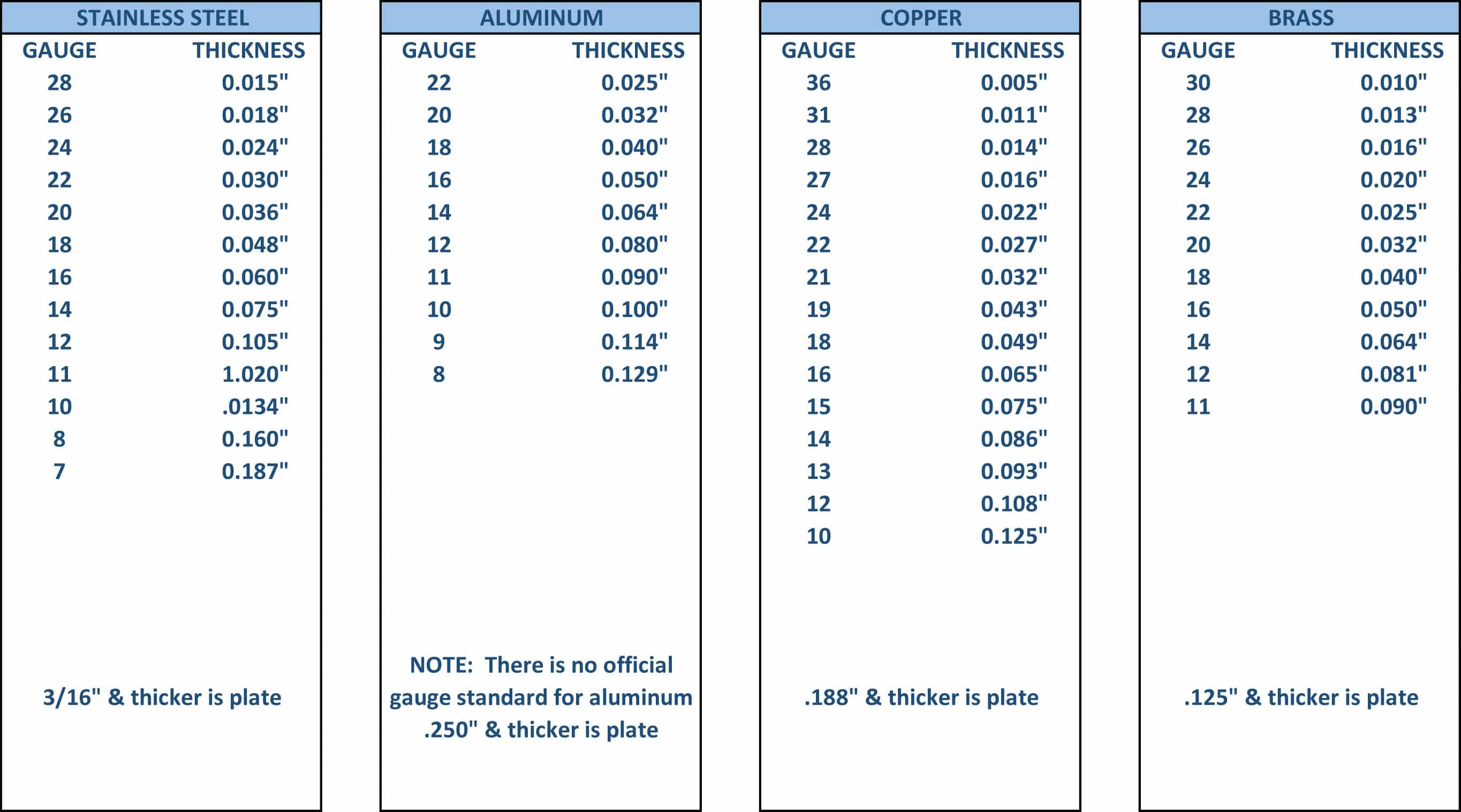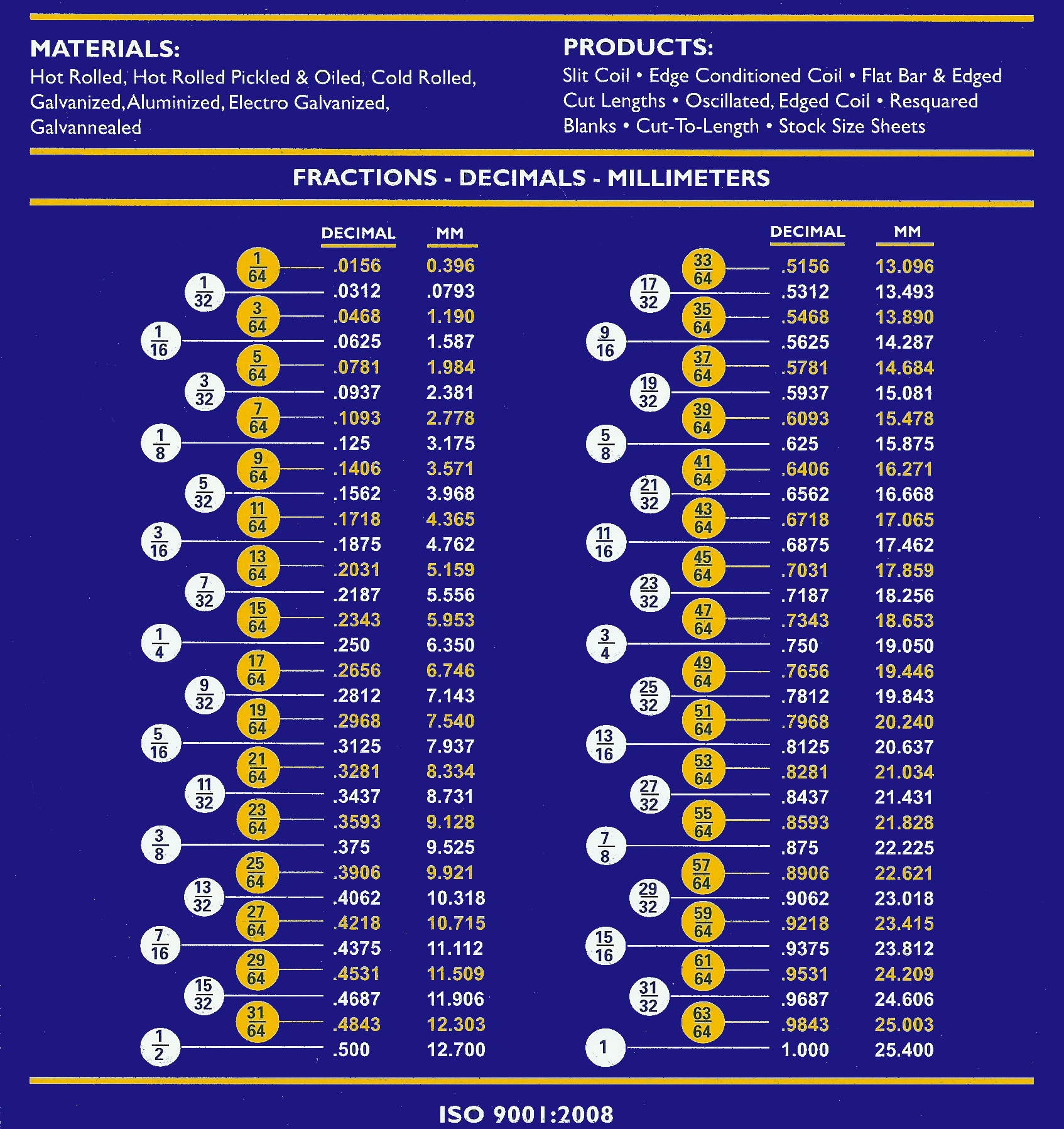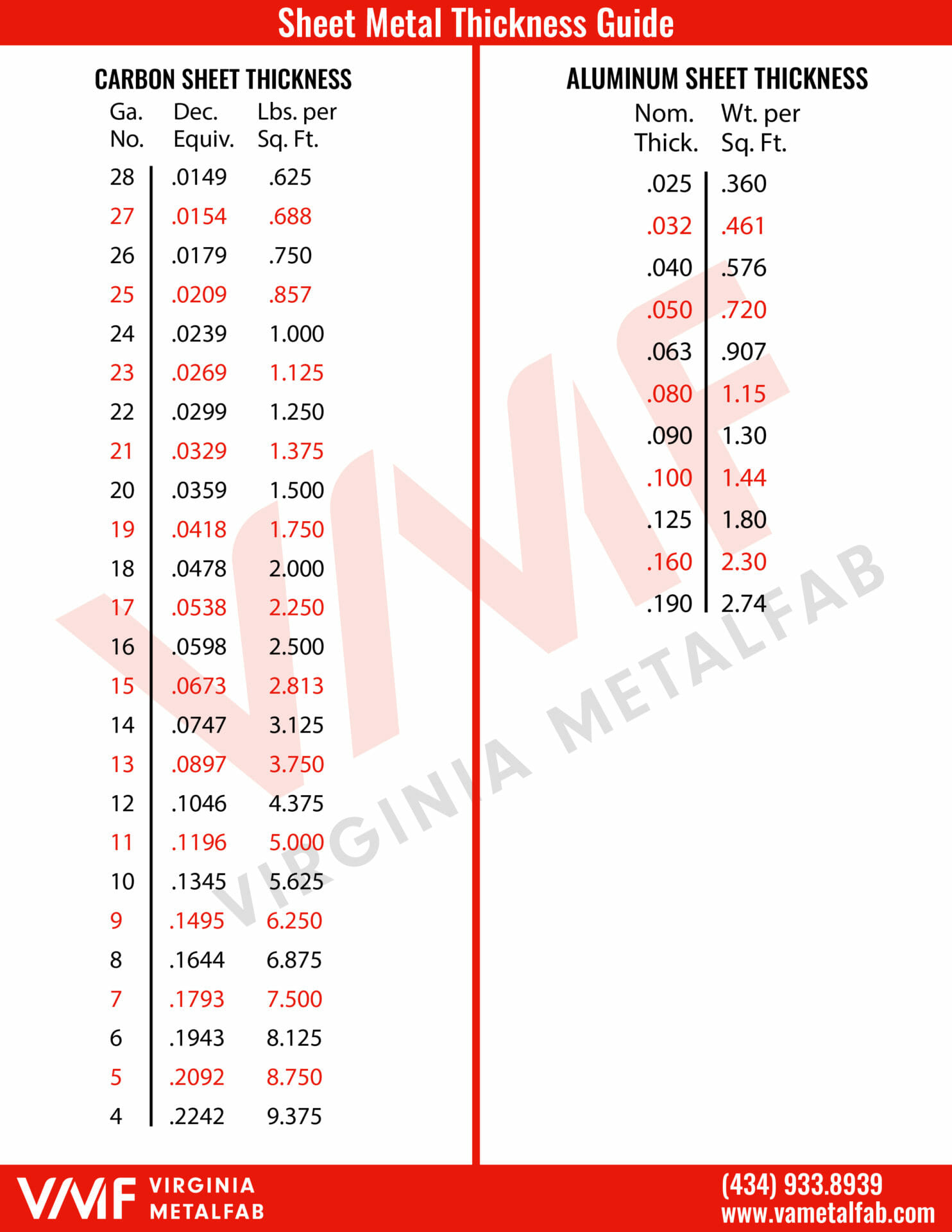Metal Sheet Thickness - Sheet metal thickness is measured using a standardized gauge system. Sheet metal gauge is a fundamental measurement in metalworking that denotes the thickness of sheet metal. Metals gauges are standard numbers developed by measuring the thickness of sheet metal in relation to its weight per square. 38 rows the chart below can be used to determine the equivalent sheet thickness, in inches or millimeters, for a gauge number from. This system is inverse, meaning that lower gauge numbers.
38 rows the chart below can be used to determine the equivalent sheet thickness, in inches or millimeters, for a gauge number from. This system is inverse, meaning that lower gauge numbers. Sheet metal thickness is measured using a standardized gauge system. Sheet metal gauge is a fundamental measurement in metalworking that denotes the thickness of sheet metal. Metals gauges are standard numbers developed by measuring the thickness of sheet metal in relation to its weight per square.
Sheet metal thickness is measured using a standardized gauge system. This system is inverse, meaning that lower gauge numbers. 38 rows the chart below can be used to determine the equivalent sheet thickness, in inches or millimeters, for a gauge number from. Sheet metal gauge is a fundamental measurement in metalworking that denotes the thickness of sheet metal. Metals gauges are standard numbers developed by measuring the thickness of sheet metal in relation to its weight per square.
Sheet Gauge Thickness And Weight Chart Steel Gauge Thickness
38 rows the chart below can be used to determine the equivalent sheet thickness, in inches or millimeters, for a gauge number from. This system is inverse, meaning that lower gauge numbers. Sheet metal gauge is a fundamental measurement in metalworking that denotes the thickness of sheet metal. Sheet metal thickness is measured using a standardized gauge system. Metals gauges.
Metal Sheet Thickness Gauge
38 rows the chart below can be used to determine the equivalent sheet thickness, in inches or millimeters, for a gauge number from. Sheet metal gauge is a fundamental measurement in metalworking that denotes the thickness of sheet metal. Sheet metal thickness is measured using a standardized gauge system. Metals gauges are standard numbers developed by measuring the thickness of.
Steel Sheet Thickness sheet
Sheet metal thickness is measured using a standardized gauge system. This system is inverse, meaning that lower gauge numbers. 38 rows the chart below can be used to determine the equivalent sheet thickness, in inches or millimeters, for a gauge number from. Sheet metal gauge is a fundamental measurement in metalworking that denotes the thickness of sheet metal. Metals gauges.
Sheet Metal Thickness Conversion Chart
Sheet metal thickness is measured using a standardized gauge system. This system is inverse, meaning that lower gauge numbers. Sheet metal gauge is a fundamental measurement in metalworking that denotes the thickness of sheet metal. Metals gauges are standard numbers developed by measuring the thickness of sheet metal in relation to its weight per square. 38 rows the chart below.
20 Gauge Galvanized Sheet Metal Thickness
Sheet metal gauge is a fundamental measurement in metalworking that denotes the thickness of sheet metal. Sheet metal thickness is measured using a standardized gauge system. Metals gauges are standard numbers developed by measuring the thickness of sheet metal in relation to its weight per square. This system is inverse, meaning that lower gauge numbers. 38 rows the chart below.
sheet metal gauge chart metal gauge sheet metal gauge sheet metal Keski
Sheet metal thickness is measured using a standardized gauge system. Metals gauges are standard numbers developed by measuring the thickness of sheet metal in relation to its weight per square. Sheet metal gauge is a fundamental measurement in metalworking that denotes the thickness of sheet metal. This system is inverse, meaning that lower gauge numbers. 38 rows the chart below.
10 Gauge Stainless Steel Thickness
Sheet metal gauge is a fundamental measurement in metalworking that denotes the thickness of sheet metal. This system is inverse, meaning that lower gauge numbers. Sheet metal thickness is measured using a standardized gauge system. Metals gauges are standard numbers developed by measuring the thickness of sheet metal in relation to its weight per square. 38 rows the chart below.
Metal Sheet Thickness Gauge
38 rows the chart below can be used to determine the equivalent sheet thickness, in inches or millimeters, for a gauge number from. This system is inverse, meaning that lower gauge numbers. Sheet metal thickness is measured using a standardized gauge system. Metals gauges are standard numbers developed by measuring the thickness of sheet metal in relation to its weight.
Metal Gauge Thickness Chart Inches
38 rows the chart below can be used to determine the equivalent sheet thickness, in inches or millimeters, for a gauge number from. Metals gauges are standard numbers developed by measuring the thickness of sheet metal in relation to its weight per square. Sheet metal gauge is a fundamental measurement in metalworking that denotes the thickness of sheet metal. Sheet.
Metal Sheet Thickness Chart
Sheet metal thickness is measured using a standardized gauge system. Metals gauges are standard numbers developed by measuring the thickness of sheet metal in relation to its weight per square. Sheet metal gauge is a fundamental measurement in metalworking that denotes the thickness of sheet metal. This system is inverse, meaning that lower gauge numbers. 38 rows the chart below.
38 Rows The Chart Below Can Be Used To Determine The Equivalent Sheet Thickness, In Inches Or Millimeters, For A Gauge Number From.
Sheet metal thickness is measured using a standardized gauge system. Sheet metal gauge is a fundamental measurement in metalworking that denotes the thickness of sheet metal. Metals gauges are standard numbers developed by measuring the thickness of sheet metal in relation to its weight per square. This system is inverse, meaning that lower gauge numbers.









